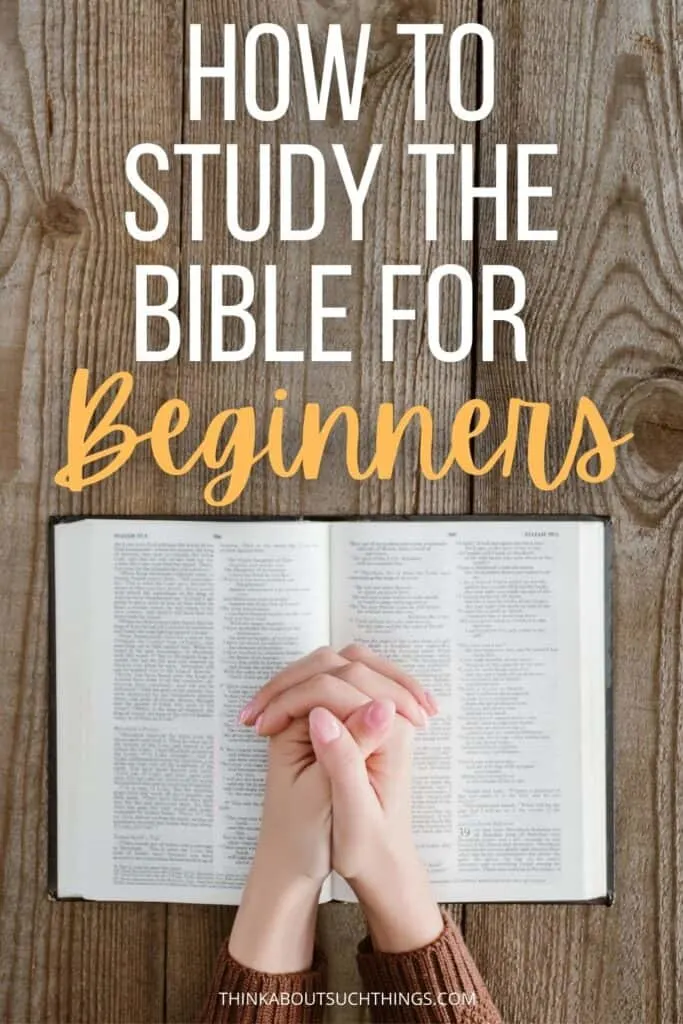In this article, we will learn how to study the Bible for beginners. We will cover ideas and easy steps you can take to explore God’s Word!
The Bible can seem like a daunting book at first – it’s ancient, it’s complex, and let’s be honest, parts of it can be downright confusing. But I’m here to tell you, it doesn’t have to be that way.
It’s true that studying the Bible is crucial for every Christian, regardless of their maturity or how long they have been saved. No matter how often you study the Bible, there is always something new that God will reveal to you or even remind you of.
It’s also important to know that reading and studying the Bible are not the same thing – reading is important, but studying means to dive deeper and making the Bible a part of your being.
Studying the Word of God is fundamental for believers, but it’s often difficult to know how to do so.
It is a skill, but also a spiritual discipline.
Believers cannot study the Bible in truth without the Holy Spirit, and learning to interpret the Scriptures takes time and a relationship with the Lord.
With that said, there are some good practical ways to start studying the Bible and grow your capacity for understanding the Word.
Let’s explore some of the easiest steps to follow when learning to study the Bible well.

How To Study The Bible For Beginners
Let’s be real the Bible is big, dense, and full of symbolism and spiritual concepts. This can feel intimidating and overwhelming at first. I remember when I first became a Christian and started getting into the Word.
I didn’t understand much. I would have read and re-read over and over again. But the Holy Spirit helped me as I kept going. And He will help you as well!!
All Scripture is God-breathed and is useful for teaching, rebuking, correcting, and training in righteousness, 17 so that the servant of God may be thoroughly equipped for every good work. – 2 Timothy 3:16-17
Where To Start Studying The Bible
Many believers struggle with this very first step:
Where should I start with my Bible studies?
Because of so many contrasting opinions, it’s easy to get discouraged and confused.
The best place to start studying and reading the Bible when learning to study is to begin in the New Testament, especially for new believers.
The Old Testament is excellent, and we should study it, but if you do so without a clear understanding of what Jesus came to do for us, you can easily get lost in fruitless religious dogma.
The books of Matthew and John are excellent places to start studying the Bible. They contain the teachings and examples of Jesus and serve as a perfect blueprint for believers, explaining and demonstrating the gospel of Jesus Christ well, and they are straightforward to read.
The book of Romans is another good starting point, as this epistle answers many questions for new believers, preaches the gospel perfectly, provides direction and instruction, and deals with several issues that new believers may face.
Here is a good tip: grab yourself a good study Bible. The commentary will help you understand many difficult passages. I recommend The New Life Application Study Bibl (NIV). This was my first Bible and I still absolutely love it.
Here are few Bible studies on different books of the New Testament:
How Much Of The Bible Should A Beginner Study?

This is a challenging question, since it requires balance.
The first crucial point is to break your Bible studying up into bite-sized chunks. Don’t try to do too much, too quickly.
Studying isn’t like reading a novel, where you want to get to the end as quickly as possible to see how it ends.
You have to take every part and digest it slowly. It’s about quality not quantity.
At the same time, context is vital in Bible study. The Bible wasn’t written like a novel. Every book was written by a specific author for a particular group of people.
There were no chapters and verses; those were only added later. So, whatever portion of scripture you study, it’s important to keep the context of the rest of that book (and the Bible as a whole) in mind.
Just remember to start off small or what you feel is doable and from there, add more to your studying.
How Often Should You Study The Bible?
This is a question you should answer for yourself, but if it is possible, then it would be a good idea to do so daily.
If daily sounds like too much, aim for several times a week. And remember, this doesn’t have to be a 2-hour study session. You can sit down and study for 10-15 minutes.
Another great tip is to join a Bible study group at church. It’s a great way to have accountability to study and plus you will have a wonderful time of fellowship with believers.
The more often you study the Bible, the easier it will become. The Bible is how we learn God’s voice and get to know Him for who He is, so Bible study will improve and deepen our relationship with Him.
The more time you spend in the Word, and the more often you study it, the more quickly you will grow and the quicker your relationship with the Lord will develop.
Which Bible Translation Should You Study?
There is no such thing as a perfect Bible translation. For general Bible reading, it’s a good idea to choose an accurate translation that’s easy to understand, like the New American Standard Bible (NASB), or the Amplified Bible (AMP).
The New King James Version of the Bible (NKJV) and the New International Version (NIV) are also great, and the King James Version (KJV) is among the most trusted, even though it is the most difficult to read.
However, for in-depth Bible study, it’s important to not rely entirely on one translation only.
You can learn so much when you compare different translations because it gives you a better idea of the different ways that a particular verse can be understood.
Ideally, try to get a copy of an Interlinear Bible which shows the original Hebrew and Greek side-by-side with an English translation, usually the King James version.
Even if you don’t know the original Bible languages, the words usually have Strong’s Concordance numbers above them, so with a copy of the Strong’s, you can easily understand even the most complicated words.
Most of these tools are also available electronically in the modern era. Some Bible study tools include the Strong’s numbers (and their meanings) free of charge, so it’s easier than ever to dive deep with your Bible study.
If you are interested in these study tools please check out these posts:
Always Read The Bible With The Holy Spirit

The last but most important aspect of studying the Bible is to always read the Bible with the Holy Spirit.
I heard a pastor once say that “the Bible is the only book that demands the Author be present while reading,” and this is among the truest statements I have ever heard about the Bible.
Always pray when studying the Bible and ask the Lord to reveal it to you.
The Scriptures will be revealed to you in a far deeper, richer, and more meaningful way than when reading the Bible on your own.
Methods To Help You Study The Bible When Starting Out
We have covered the best ways to start reading and studying and reading the Bible, but there are many helpful tips that can help you make good progress as you go on the journey of Bible study.

Here are some of the best practical tips for beginner Bible study. Remember, these are tips and methods. Nothing is set in stone…
For more methods please check these out as well:
- The SOAP Bible Study Method Done Easy
- Bible Character Study 101 (How-To Guide)
- Topical Bible Study: An Easy How-To Guide To Get You Started
- 9 Easy Bible Study Methods That Will Deepen Your Faith
- 11 Helpful Books on How to Study the Bible
1. Write Down What Stands Out To You
As you read and study your Bible, keep a notebook or journal at hand, and write down any verses, passages, or chapters that stand out to you.
Also, write down any revelation that you receive from the Scriptures.
This is an excellent way to help yourself progress in Bible study and to help you remember the Word as you read it.
2. Study A Chapter A Day
Study a chapter of your Bible every day. The decision to study at least one chapter every day, even on the busiest days, will keep you accountable and consistent in Bible study.
3. Study The Old And New Testaments
The Old Testament can feel impossible to study, but it is just as important as the New Testament.
Take the time to study portions of the Old Testament, beginning with easier books such as Psalms, Proverbs, and the Prophets, such as Isaiah and Jeremiah, and integrate both the Old and New Testaments into your Bible study.
Studying both the Old and New Testaments teaches Christians so much more, helps us grow more quickly, and gives context to the gospel of Christ.
>>The Difference Between The Old and New Testament
4. Use A Study Bible
An excellent way to grow in Bible study is to use a Study Bible. There are several study bibles available, and all are useful in the same way.
Study Bibles include historical and contextual insights into the Scriptures in the Bible, provide extra study material, explanations of passages, and even more accurate word translations.
Study Bibles are wonderful tools for studying and reading the Bible and can help unlock many mysteries hidden in the Word. I love a good study Bible!
Here are some of my top picks on Bible studies…I own these and love them.
5. Use Online Resources
There are many online Bible resources, including Bible studies and even concordances of the Bible, to help you navigate it.
Online resources and study guides can be a great benefit for Bible study and will help you progress more quickly. Be careful to choose trusted resources that adhere to good doctrines, such as the Bible Project and Strong’s Concordance of the Bible.
6. Use A Bible Smartphone App
Smartphone Bible apps can be a good tool for Bible study, as they have daily devotional plans, reading plans, study tips and guides, and even community features that can help keep you accountable.
As long as the app encourages you to read your physical Bible, it can be a good tool for Bible study while you’re learning how to study the Bible.
Studying the Bible can feel challenging, especially when you are just a beginner. But with some time, practice, and communion with the Lord, Bible study will quickly become a crucial part of your daily walk with God!
Take the time to study your Bible every day, and you will grow quickly in the Lord, and the Scriptures will become far more accessible.
It will also help guard you against false teaching, because you will know the context of every verse that false teachers quote. Committing to regular, proper Bible study could be one of the most important steps you will ever take in your spiritual life.
I hope this article was helpful and that it has stirred your faith to get into God’s Word.

Melissa is a passionate minister, speaker and an ongoing learner of the Bible. She has been involved in church and vocational ministry for over 18 years. And is the founder of Think About Such Things. She has the heart to equip the saints by helping them get into the Word of God and fall more in love with Jesus. She also enjoys family, cooking, and reading.
She has spoken in churches in California, Oregon, Texas, and Mexico and has been featured in Guidepost Magazine and All Recipes Magazine. Read More…





